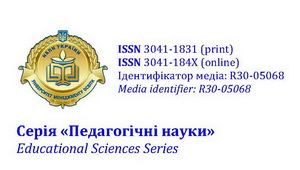System for teaching algebra using ICT in higher pedagogical education
Анотація
Ключові слова
Повний текст:
PDF (English)Посилання
REFERENCES / СПИСОК ВИКОРИСТАНИХ ДЖЕРЕЛ
R. B. Alıyev, Xətti cəbr və riyazi analiz kursu. Bakı, Azərbaycan : ADPU, 2019.
Y. R. Baxşəliyev, Cəbr və ədədlər nəzəriyyəsi kursu. Bakı, Azərbaycan : Nurlan, 2008.
İ. Y. Bayramov, Ali texniki məktəblərdə riyaziyyat kursunun tədrisinə informasiya texnologiyalarının tətbiqi üzrə işin sistemi: üzrə fəlsəfə doktoru dis. avtoreferatı. Bakı, 2013.
I. Ş. Cabbarov, Ali cəbr kursu. Bakı, Azərbaycan : Mütərcim, 2018.
F. G. Feyziyev, Cəbr və ədədlər nəzəriyyəsi. Bakı, Azərbaycan : Təhsil NPM, 2010.
Ə. R. Quliyev, Riyaziyyatın tədrisində ümumiləşdirmə. Bakı, Azərbaycan : Nurlan, 2009.
H. Tağıyev, Təhsildə İKT-nin tətbiqi metodikası. Bakı, Azərbaycan : Elm və təhsil, 2019.
E. Erbilgin, «Matematik Ögretmeni Yetiştirme Proqramlarımızın Finlandiya, Japoniya ve Singapore Proqramları ile Karşılaştırılması», Hacettepe Üniversitesi egitim Fakültesi Dergisi, Özel sayı (1), рр. 156–170, 2013. [Online]. Available: http://www.efdergi.hacettepe.edu.tr/yonetim/icerik/makaleler/286-published.pdf Application date: January 05, 2025.
A. Erkan, B. Gülsün, A. Baskan, Ögretmen yetiştirme sistemlerinin karşılaştırmalı olarak degerlendirilmesi: Japoniya ve Kore cumhuriyeti (Güney Kore) örnegi : Müəllim hazırlama siyasəti problemləri beynəlxalq konfrans. Bakı : Qafqaz Universiteti, 2015, pр. 18–23.
F. S. Uçak, Soyut cebir dersi veren ögretim elemanlarının ögretim uyğulamaları: yüksek lisans tezi. Konya, 2019.
TRANSLATED AND TRANSLITERATED / ПЕРЕКЛАД, ТРАНСЛІТЕРАЦІЯ
R. B. Aliyev, Course of linear algebra and mathematical analysis. Baku, Azerbaijan : ASPU, 2019. (in Azerbaijani).
Y. R. Bakhshaliev Course of algebra and number theory. Baku, Azerbaijan : Nurlan, 2008. (in Azerbaijani).
I. Yu. Bayramov, System of work on the application of information technologies in teaching mathematics in higher technical educational institutions: author's abstract. diss. doctor of philosophy. Baku, 2013. (in Azerbaijani).
I. Sh. Jabbarov, Course of higher algebra. Baku, Azerbaijan : Mutarjim, 2018. (in Azerbaijani).
F. G. Feyziev, Algebra and number theory. Baku, Azerbaijan : Tahsil NPM, 2010. (in Azerbaijani).
A. R. Guliyev, Generalization in Teaching Mathematics. Baku, Azerbaijan : Nurlan, 2009. (in Azerbaijani).
H. Tagiev, Methodology of ICT Application in Education. Baku, Azerbaijan : Science and Education, 2019. (in Azerbaijani).
E. Erbilgin, «Comparison of Our Mathematics Teacher Training Programs with Those of Finland, Japan and Singapore», Journal of the Faculty of Education, Hacettepe University, Special Issue (1), рр. 156–170, 2013. [Online]. Available: http://www.efdergi.hacettepe.edu.tr/yonetim/icerik/makaleler/286-published.pdf Application date: January 05, 2025. (In Turkish).
A. Erkan, B. Gülsün, A. Baskan, Comparative Assessment of Teacher Training Systems: The Case of Japan and the Republic of Korea (South Korea) : International Conference on Teacher Training Policy Issues. Baku : Caucasus University, 2015, pр. 18–23. (In Crimean Tatar).
F. S. Uçak, Pedagogical practice of teachers of abstract algebra: master's thesis. Konya, 2019. (In Turkish).
Посилання
- Поки немає зовнішніх посилань.
